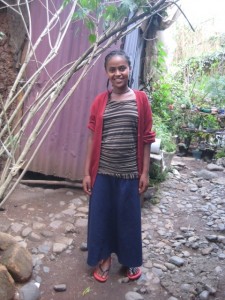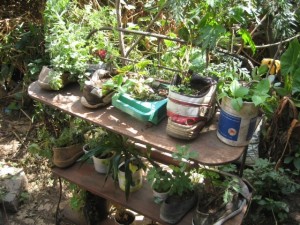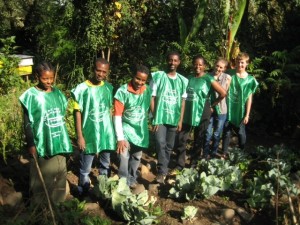Giving Youth a Hand to Create a Sustainable World
Mar 26th, 2013 | By admin | Category: Youth RightsBy Suzanne York, www.howmany.org
Today’s global youth, of course, will inherit the world. And given the state of this world, it is more important than ever to invest in young adults, and help provide them with opportunities to create a healthy society.
One specific project in Ethiopia is providing much hope. It is called Tena Kebena, and it is empowering a small, impoverished community in the capital city of Addis Ababa where the people live next to a polluted river and garbage dump (in the Amharic language, Tena means health and Kebena and Ginfle are the names of two local rivers).
Started by two young men concerned about the community’s pollution and garbage problem, Tena Kebena’s official mission is to enable citizens to free themselves from poverty and lead healthy and productive lives by promoting urban agriculture, environmental education, HIV/AIDS awareness, and promoting gender and social issues, such as family planning.
With the exception of the occasional small donation, the project is all-volunteer run. Approximately 30 youth from the community currently participate in the community resource center.
A visit to the Tena Kebena site is an amazing experience. They do so much with so little. The road leading up to the community center is full of passion flower and other indigenous plants. Inside the property, there is an abundant garden of organic fruits, vegetables and herbs, plus a greenhouse. There are close to 50 medicinal plants on the property, including a plant endemic to Ethiopia used to treat malaria. Plant containers are often recycled containers such as shoes or plastic items found amongst garbage. There is also a bee hive that produces organic honey.
The main activities and services of Tena Kebena are many, and include:
- Peer to peer education on condom use and HIV/AIDS
- Sustainable agriculture (including tomatoes, lettuce, bee hives/organic honey)
- Seedlings to sell to locals and raise money
- How to recycle (and make goods from recycled products to sell)
- Education about indigenous knowledge (especially of plants for natural and traditional medicine)
- Bio-intensive gardening
- Environmental protection efforts (i.e., planting native trees to combat soil erosion)
- Natural resource management skills
- Computer skills
This small organization has successfully taken on many projects to educate and empower local youth who otherwise would have nowhere else to go and/or would get into trouble. Instead, they are building skills to help out not only themselves and their community, but the entire country. And they are doing so by integrating social, economic, and environmental issues, a much better approach than dealing with each as a stand-alone sector.
The dedicated people of Tena Kebena demonstrate that a lot can be accomplished without much funding (though it is this type of social entrepreneurship that funders should be supporting).
In 2009, Tena Kebena won the United Nations Environment Programme’s Champions of the Earth Award.
Alemayehu Akalu, one of the co-founders and current director, made a simple observation that should guide most projects and organizations. He said that “the problem was local and so the solution should be local.” After all, it is the local community that knows what the most pressing issues are, have traditional practices that can be tapped to overcome many of them, and should be empowered to solve all of them.
Suzanne York is a senior writer with the Institute for Population Studies.



